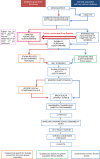Study protocol for a nationwide Knowledge, Attitudes and Practices (KAP) survey on diabetes in Singapore's general population
- PMID: 32540891
- PMCID: PMC7299045
- DOI: 10.1136/bmjopen-2020-037125
Study protocol for a nationwide Knowledge, Attitudes and Practices (KAP) survey on diabetes in Singapore's general population
Abstract
Introduction: This study aims to establish the Knowledge, Attitudes and Practices (KAP) of the general population (people with and without diabetes) towards diabetes. The study will examine (a) recognition and understanding of causes, prevention and treatment strategies of diabetes; (b) identify the knowledge gaps and behavioural patterns that may hamper diabetes prevention and control; (c) stigma towards and stigma perceived by people with diabetes and (d) awareness of anti-diabetes campaigns.
Methods and analysis: The study is a nationwide, cross-sectional study of Singapore's general population aged 18 years and above (n=3000), comprising Chinese, Malay, Indian and other ethnic groups, who can understand English, Chinese, Malay or Tamil language. The sample was derived using a disproportionate stratified sampling using age and ethnicity. The proportion of respondents in each ethnic group (Chinese, Malay and Indian) was set to approximately 30%, while the proportion of respondents in each age group was set around 20% in order to ensure a sufficient sample size. The respondents will be administered questionnaires on diabetes KAP, stigma towards diabetes, lifestyle, diet and awareness of local anti-diabetes campaigns. The analysis will include descriptive statistics and multiple logistic and linear regression analyses to determine the socio-demographic correlates of correct recognition of diabetes, help-seeking preferences, as well as overall knowledge and attitudes among those with and without diabetes. We will consider a p value ≤0.05 as significant.
Ethics and dissemination: This study protocol has been reviewed by the Institutional Research Review Committee and the National Healthcare Group Domain Specific Review Board (NHG DSRB Ref 2018/00430). The results of the study will be shared with policymakers and other stakeholders. There will be a local mass media briefing to disseminate the findings online, in print and on television and radio. The results will be published in peer-reviewed journals and presented in scientific meetings.
Keywords: diabetes & endocrinology; epidemiology; public health.
© Author(s) (or their employer(s)) 2020. Re-use permitted under CC BY-NC. No commercial re-use. See rights and permissions. Published by BMJ.
Conflict of interest statement
Competing interests: None declared.
Figures




References
-
- World Health Organization Global report on diabetes, 2016. Available: https://www.who.int/diabetes/global-report/en/ [Accessed 2 Dec 2019].
-
- The Straits Times Aw Cheng Wei Singapore Economy ranked world’s most competitive, 2019. Available: https://www.straitstimes.com/business/economy/singapore-economy-ranked-w... [Accessed 2 Dec 2019].
-
- World Health Organisation World Health Organisation assesses the world’s Health systems, 2000. Available: https://www.who.int/whr/2000/media_centre/press_release/en/ [Accessed 25 Oct 2019].
Publication types
MeSH terms
LinkOut - more resources
Full Text Sources
Medical
